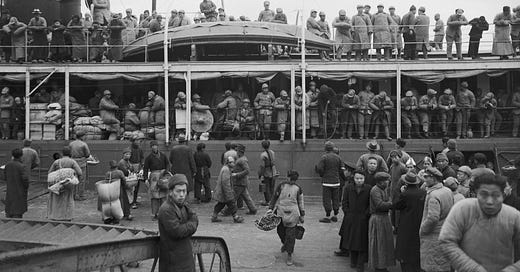Book Review: Last Boat out of Shanghai
The book follows four characters as they navigate China from WWII to Mao Zedong

Last Boat Out of Shanghai
By, Helen Zia
In 1930s China, Benny Pan was a rich kid, Ho Chow was the star student, Annuo Liu was a nomad and Bing Woo was a discarded child.
In Last Boat out of Shanghai, published in January, 2019, we follow these four main characters as they navigate Japanese occupation, the rise of the Chinese Communist Party and the hurdles their own lives.
For readers of Aseophile, this book is a must read. It beautifully weaves personal anecdotes, accurate history and delightful characters to help readers imagine an incredibly important time and place in history.
My criticisms come from a place of sheer admiration; the way people often nitpick art that they adore rather than waste time on art they hate. Let’s dive into it!
This is a book about Shanghai, not China
Shanghai has always been the jewel of China. It is wealthier than its neighbours, more international than other Chinese cities and more glamorous than most of Asia. It is the New York City of the East.
And much like New York City, it is its own bubble. New York City is a world apart from America. The rest of the country is America. New York is New York. Shanghai is similar.
So when approaching Last Boat out of Shanghai, it is important to understand the reader is not going to learn much about China. In this book, Guandong is a far away land and Beijing is mentioned only once or twice.
That being said, if there is one Chinese city from this period that demands its own book, it is most certainly Shanghai.
The World War II section is far more interesting than the Communist takeover.
Last Boat out of Shanghai is a masterpiece built on hundreds of hours of interviews. It presents the stories of four people as best as they could possibly tell. One consequence is the first half of the book — which takes place in World War II — is more vivid, more interesting and more detailed.
I think the reason is a mixture of two facts. First, war is terrible and the memories of the time sear themselves into minds of everyone involved. All of these years later, it might just be that the World War II memories are the most vivid.
Second, I wondered if, even as elderly folks living abroad, the subjects were hesitant about how open and honest they would be about Communist China. While certain moments of the Mao-portion of the book were engaging, a significant portion felt like families running away from an opaque shadow we never really got to see.
(That being said, the scene when the communists first arrive in Shanghai might be the best chapter of the book).
It provides a window into a culture that is both long-gone and still vibrant
The book is an excellent example of why it is important to promote diversity in authorship. The author is the daughter of one of the main characters.
Because of this relationship, a lot of the cultural differences between the East and West are not treated as ‘other’ or ‘strange’. The families are not portrayed as ‘natives’, written by some frontiersman reporting back to the homeland.
Rather, the local culture percolates to the top, and much of the differences are subtle and treated with the respect they deserve. This allows for an emergence of the individualisation of the characters.
Generations change culture, but culture persists generations. Last Boat out of Shanghai is a wonderful window into a specific generation of Chinese culture. There are decisions made in the book based entirely on tradition, and other choices made to reject cultural pressures.
Critique: The main characters are heroes
The tribulations faced by the characters are remarkable, but the people themselves lack the flaws that can make for more interesting personalities.
The characters themselves never make a disappointing, unethical or hearth breaking mistake. A lot of the negative events in the book happen TO the characters, not BY them.
I think this is just a part of relaying complicated stories as told by the subjects. Nobody is really going to open up about their dark moments outside of a tell-all memoir.
Why I love this book so much
As a lover of history, I am keenly aware that not everyone shares the same enthusiasm. History books can be thick, long and boring. Last Boat out of Shanghai is beautifully written, engaging, funny at times and deeply human. It’s also accurate.
I think I am such a fan of Last Boat out of Shanghai because it makes history accessible. This book could be confused as fiction. It reads like any other novel, which I find immensely valuable.
For anyone remotely interested in 20th Century Chinese history, this is a must read.
—


